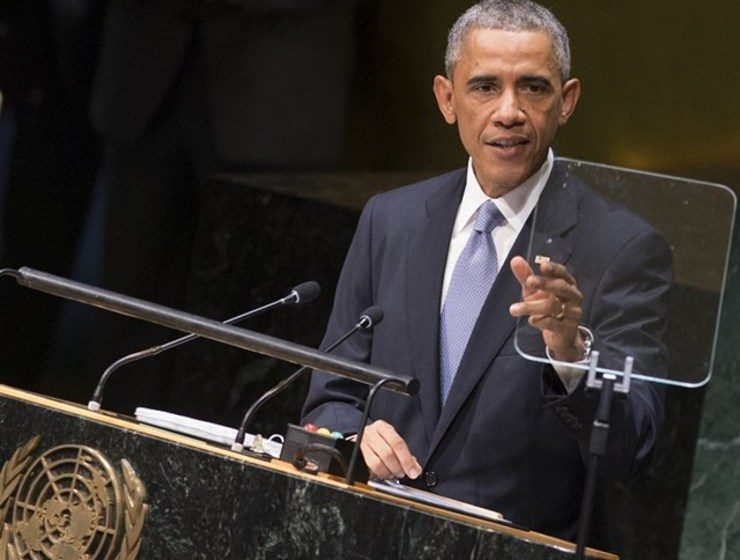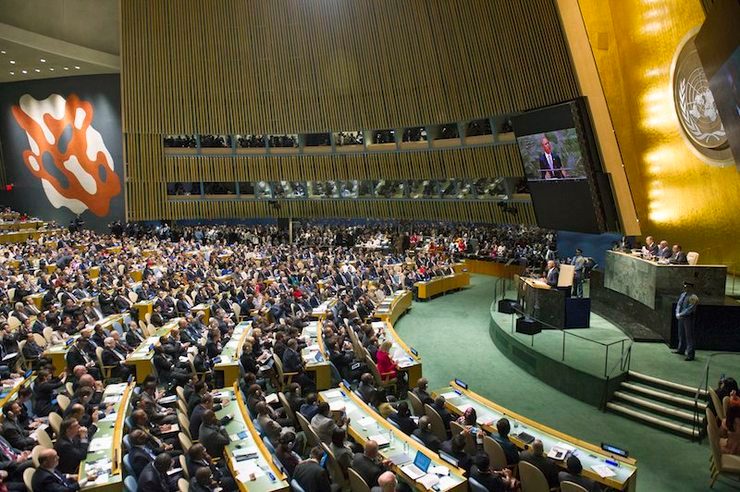SUMMARY
This is AI generated summarization, which may have errors. For context, always refer to the full article.

UNITED NATIONS – US President Barack Obama urged China to abide by international law following growing tensions with countries in the Asia Pacific over maritime disputes.
Obama raised the territorial row between Beijing and Southeast Asian nations as he addressed the United Nations General Assembly, the world’s largest annual diplomatic gathering.
“We will insist that all nations abide by the rules of the road, and resolve their territorial disputes peacefully, consistent with international law,” Obama said on Wednesday, September 24.
He added, “That’s how the Asia Pacific has grown. And that’s the only way to protect this progress going forward.”
The President also reiterated his commitment to America’s so-called pivot or rebalance to Asia, a policy to boost the US’ ties with allies with the region and expand its naval presence there. Analysts see the strategy as an effort to respond to China’s rise as a military, political and economic power.
“America is and will continue to be a Pacific power, promoting peace, stability, and the free flow of commerce among nations,” he said.
Obama’s statement comes a day after Philippine President Benigno Aquino III expressed concern about Beijing’s growing aggression in the South China Sea.
Aquino told The Associated Press that he fears China might send an oil rig to waters the Philippines claims, as it did with Vietnam in early May, causing one of the worst breakdowns in Sino-Vietnam relations.
The Philippine leader again questioned the presence of two Chinese hydrographic ships in the Reed Bank last June. “What is clear is that there were two ships which were performing certain measurements in this feature which is part of the Philippines EEZ.”
The Philippines filed in 2013 a landmark arbitration case against China before a United Nations-backed tribunal, whose jurisdiction Beijing refuses to recognize. Aquino just came from a 4-nation European trip seeking international support for the Philippine initiative.
Obama administration officials have earlier questioned the basis of Beijing’s claims in international law. Daniel Russel, the top US diplomat for East Asia, said in February that China must adjust its “nine-dash line” claim according to international law, specifically the UN Convention on the Law of the Sea.
A key ally and former colony of the US, the Philippines entered into a military agreement with America that gives its troops greater access to Philippine bases and allows them to build facilities there. The move was widely seen as an effort to address Chinese assertiveness in the region.
Besides the Philippines and Vietnam, Malaysia, Brunei and Taiwan all have claims to parts of the South China Sea.
‘Failure of international system’

Obama touched on the South China Sea disputes as he discussed whether or not the UN’s 193 member states are able to renew the purpose of the organization’s founding to maintain international cooperation, peace and security after World War II.
He cited the Ebola outbreak in West Africa, Russian aggression in Europe, and threats from the terrorist group Islamic State of Iraq and Syria (ISIS) as examples.
“Each of these problems demands urgent attention. But they are also symptoms of a broader problem – the failure of our international system to keep pace with an interconnected world …. Too often, we have failed to enforce international norms when it’s inconvenient to do so.”
“We believe that right makes might – that bigger nations should not be able to bully smaller ones; that people should be able to choose their own future.”
Besides China, he also criticized Russia over the annexation of Crimea and its alleged invasion of eastern Ukraine.
“When a civilian airliner was shot down from areas that these proxies controlled, they refused to allow access to the crash for days. When Ukraine started to reassert control over its territory, Russia gave up the pretense of merely supporting the separatists, and moved troops across the border,” Obama said.
In the second part of his speech, Obama spoke lengthily about the US strategy against ISIS, calling on the international community to support the campaign. He spoke just two days after the US launched airstrikes in Syria, a controversial move that lacked the backing of the UN Security Council, the US Congress, and the Syrian government.
On Wednesday afternoon, Obama chaired a historic meeting of the UN Security Council addressing the threat of foreign terrorist fighters. It is only the second time in history that an American president presided over the UN organ in charge of peace and security.
At least a dozen heads of state attended the meeting. The Council unanimously approved a US-drafted resolution calling on UN member states to pass domestic laws and measures against foreign jihadis. – Rappler.com
Rappler multimedia reporter Ayee Macaraig is a 2014 fellow of the Dag Hammarskjöld Fund for Journalists. She is in New York to cover the UN General Assembly, foreign policy, diplomacy, and world events.
Add a comment
How does this make you feel?
There are no comments yet. Add your comment to start the conversation.